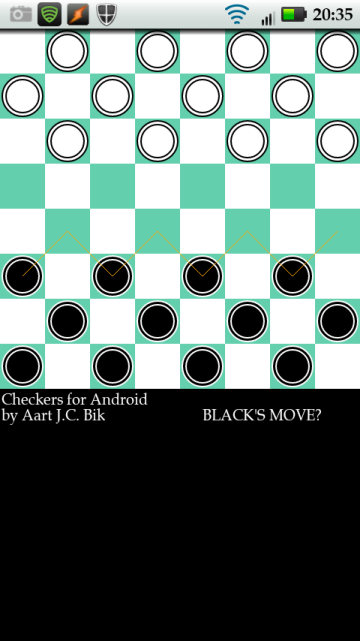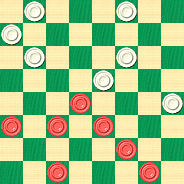The Checker Maven
Jump to navigationChecker Apps for Android

A few weeks back, we presented Ed Gilbert's review of checker apps for the iPhone. We promised a similar review of Android apps, and we're bringing you that review today.
The iPhone scene was frankly pretty bleak. Ed didn't find a single truly serious checker app for the popular Apple smartphone. We'll cut to the chase: for Android phones, the situation is somewhat better. There are two reasonable candidates for the "serious app" title and a whole host of "toy" apps.
As was the case with the iPhone, there is just too much detail for a single weekly column, so instead you'll find the full details on this separate web page.
The two apps that we think merit consideration are Checkers Tutor, by world class checker programmer Martin Fierz (author of CheckerBoard and the Cake computer engine), and Checkers for Android by programmer Aart Bik, who is best known for Chess for Android. Aart's checker app is free and Martin's app sells for just one dollar.


Martin Fierz and Aart Bik
Interesting and detailed email interviews with both Martin and Aart can be found on the web page linked above.


So, which app should you install? Checkers Tutor plays a reasonable game, certainly well above the casual skill level. The same can be said of Checkers for Android. It's also safe to say that neither of these will provide a serious challenge to a master-level player.
Our usual benchmark is Martin Fierz's Simple Checkers engine. Both Checkers Tutor and Checkers for Android play somewhat better than Simple, at least based on the limited trial matchups conducted in our offices. But you won't get play at the level of Cake or KingsRow, either.
There's some irony here. Both Martin and Aart received a lot of user feedback saying that the engines are too strong and that the user can never win a game! This perhaps says more about the casual player than it does about the strength of the computer engines.
How do Checkers Tutor (CT) and Checkers for Android (CFA) compare with each other?
CT has hands-down the better graphics and display, and some additional play features, such as move take-back and replay, neither of which are present in CFA. Both programs lack a move list or a means of exporting moves. CT has optional square numbers; CFA allows compulsory jumping to be turned off, which you may consider a feature or an anti-feature, but Aart says users demanded it. CT allows for selection of a random 3-move ballot. CFA has a tiny endgame database which most notably will allow it to convert a two kings vs. one win, something a surprising number of programs can't do.
Neither app allows for position set-up, but neither engine is really strong enough to do meaningful analysis.
Which engine plays better checkers? That's a good question. We think CT has a definite edge, albeit not a large one. In the two head-to-head matches that we conducted, CT handily won one of them. CFA got a winning position in the other game but then couldn't figure out the ending and the result was a draw. Such limited testing is hardly decisive, of course.
Our bottom line is that there's little reason not to install both apps and make your own comparison. It will only cost you a dollar, after all, and you'll have a lot of fun ahead of you.
Several of the test games are on the companion page mentioned earlier. What we'll show you here is an excerpt from one of the games between CT and CFA. We'll stop at one of the game's critical points and let you take over.
The game was played on April 18, 2012 at the Hawai`i State Library. Checkers Tutor had Black and played at 15 seconds per move. Checkers for Android had White and played at 10 seconds per move (it wasn't possible to set the same timing for both).
| 1. | 11-15 | 23-19 |
| 2. | 8-11 | 26-23 |
An inferior move; 22-17 or 22-28 are better.
| 3. | 9-14 |
4-8 holds the edge.
| 3. | ... | 22-18 |
A checker subtlety: 22-17 equalizes, while this does not.
| 4. | 15x22 | 25x9 |
| 5. | 5x14 | 29-25 |
| 6. | 11-15 |
4-8 would have maintained the lead.
| 6. | ... | 25-22 |
| 7. | 14-18 | 23x14 |
| 8. | 10x26 | 19x10 |
| 9. | 6x15 | 31x22 |
| 10. | 4-8 | 27-23 |
| 11. | 2-6 | 21-17 |
| 12. | 7-10 | 23-18 |
| 13. | 8-11 | 17-13 |
This move loses; 30-26 is correct. CT now has a win on the board but won't find it. Will you?

BLACK (CT)
Black to Play and Win
B:W32,30,28,24,22,18,13:B15,12,11,10,6,3,1.
Who's better, CT, CFA, or you? Match wits with the computer, then click on Read More to see the solution.![]()
Solution
| 14. | 1-5* |
In the actual game, CT played the natural looking 12-16, which only draws. CT went on to make a few more mistakes, and CFA ultimately went a piece up but could not convert the endgame. The final result was a draw.
| 14. | ... | 30-26 |
| 15. | 12-16 | 26-23 |
| 16. | 16-20 | 32-27 |
| 17. | 5-9 | 23-19 |
| 18. | 3-8 |
White now has not a single good move.
| 18. | ... | 19-16 |
| 19. | 10-14 | 16x7 |
| 20. | 14x32 |
Black wins. An instructive situation.
You can email the Webmaster with comments on this article.
